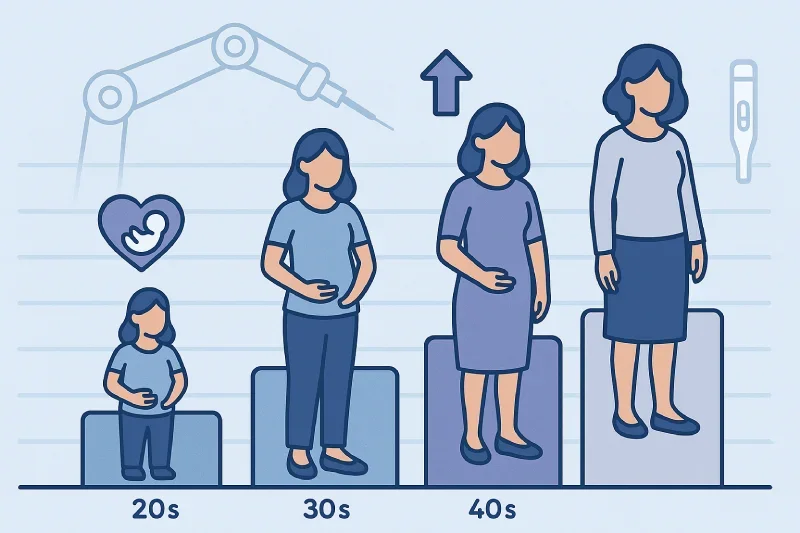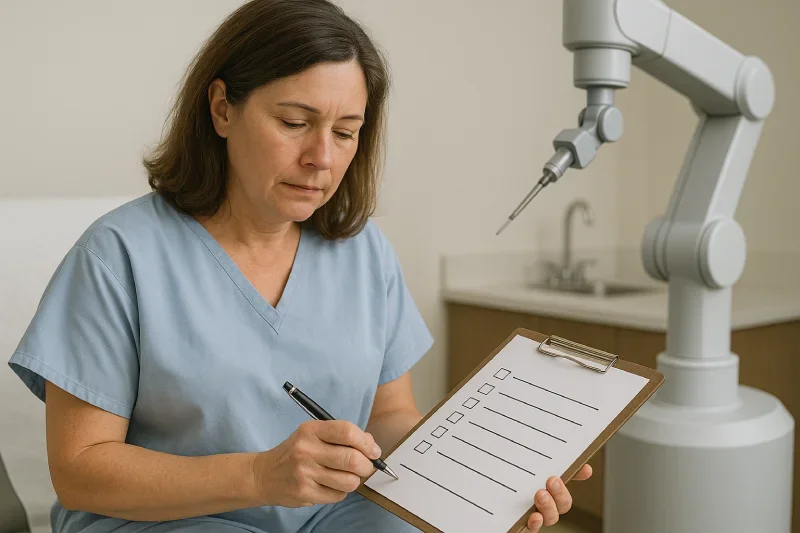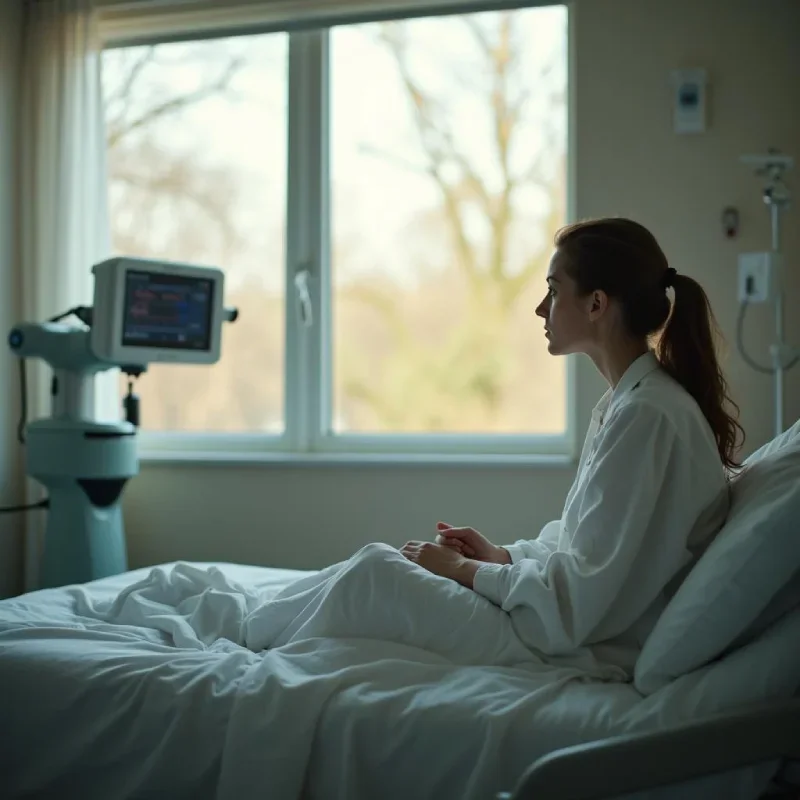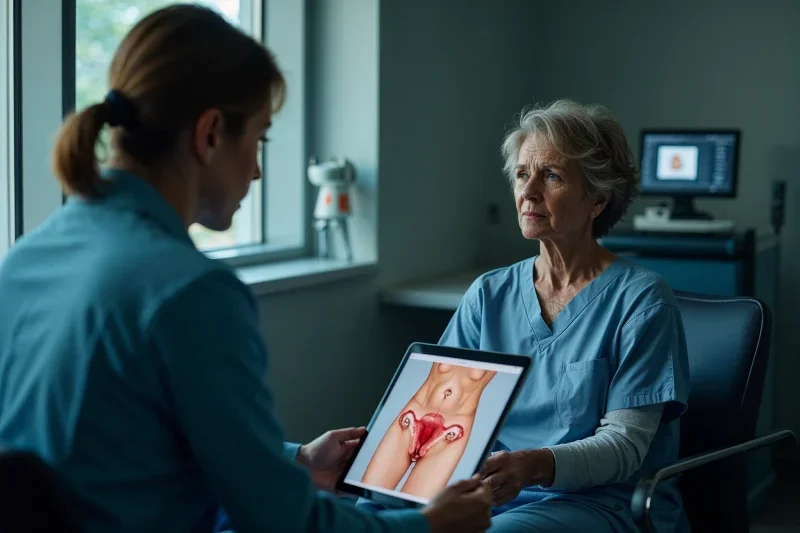Robotic Essure Reversal Pregnancy Success by Age Group
Categories:
By: Ethan Cole
Considering robotic Essure reversal? Age plays a crucial role in your pregnancy success rates. While this minimally invasive procedure offers hope for restoring natural fertility, understanding realistic expectations based on your age helps you make informed decisions.
Success rates vary dramatically across age groups. Women under 40 see the highest pregnancy rates, often comparable to IVF outcomes. Those in their early 40s experience moderate success, while rates decline significantly after 42.
This guide breaks down specific success rates by age group, explains why age matters, and helps you understand what to expect from robotic Essure reversal at different life stages.
Key Takeaways
Age is the primary success factor: Women under 40 have the highest pregnancy rates (38-60%) after robotic Essure reversal, comparable to IVF outcomes in the same age group.
Early 40s show moderate results: Success rates for ages 40-42 range from 36-68%, but live birth rates may be lower due to increased miscarriage risk with advancing age.
Rates decline significantly after 42: Women over 42 face substantially reduced success rates of 27% or lower, reflecting natural fertility decline that accelerates at this age.
Multiple factors influence outcomes: Partner fertility, overall health, surgeon experience, tube reconstruction quality, and lifestyle choices all impact success beyond age considerations.
Minimally invasive approach offers benefits: Robotic surgery provides same-day discharge, faster recovery, enhanced precision, and the ability to restore natural fertility rather than requiring ongoing treatments.
Timing is crucial for success: Starting conception attempts after complete healing (6-12 weeks) but before further age-related decline maximizes your chances of achieving pregnancy.
Understanding Robotic Essure Reversal
If you're considering reversing your Essure sterilization, robotic surgery offers a modern approach to restoring your fertility. This procedure removes the Essure coils from your fallopian tubes and reconstructs the damaged areas, giving you another chance at natural conception.
What is Robotic Essure Reversal?
During robotic Essure reversal, your surgeon uses advanced robotic instruments to carefully remove the Essure coils that were placed in your fallopian tubes. The procedure then focuses on reconstructing the tubes to create clear pathways for your eggs to travel naturally.
The surgery typically takes between two to three hours. Your surgeon makes several small incisions and uses robotic tools for enhanced precision. This approach allows for detailed work on the delicate fallopian tube structures while minimizing trauma to surrounding tissues.
Benefits of the Robotic Approach
Minimally invasive: Small incisions reduce scarring
Outpatient procedure: Go home the same day
Enhanced precision: Robotic tools improve surgical accuracy
Faster recovery: Most patients return to normal activities within 1-2 weeks
Lower complication rates: Reduced risk compared to open surgery
Age and Pregnancy Success Rates: The Complete Picture
Your age at the time of robotic Essure reversal is the single most important factor determining your pregnancy success. Understanding these rates helps set realistic expectations and guides your fertility planning decisions.
Success Rates by Age Group
Why Age Matters for Fertility
Age affects every aspect of your reproductive system after Essure reversal. Younger women have healthier eggs with better genetic quality, which directly impacts both conception rates and successful pregnancies that result in live births.
Your ovarian reserve also declines with age. Women under 40 typically have more eggs available for fertilization, while those over 42 face natural fertility decline that affects even the best surgical outcomes.
Egg quality deteriorates over time, leading to higher miscarriage rates in older patients. This explains why pregnancy rates and live birth rates can differ significantly, especially for women in their early 40s.
The health of your fallopian tubes also plays a role. Younger tissue generally heals better after reconstruction, creating more favorable conditions for natural conception.
Your overall reproductive health, including hormone levels and menstrual cycle regularity, typically remains more robust in younger years, supporting better post-surgery fertility outcomes.
Success Rates Under Age 40: Your Best Window
If you're under 40, robotic Essure reversal offers your highest chance of pregnancy success. This age group consistently shows the most promising outcomes, often matching or exceeding other fertility treatments.
Pregnancy Success Rates
Women under 40 can expect pregnancy rates exceeding 38% after robotic Essure reversal. Many studies report even higher success rates, with some showing pregnancy rates between 40% and 60% for tubal reversal surgeries using robotic techniques.
These rates reflect successful pregnancies within the first year to 18 months after surgery. Some women conceive within the first few months, while others may take up to a year or longer.
The success rates remain consistent across the under-40 age group, though women in their early 30s often see slightly higher rates than those approaching 40.
Comparison to IVF Success Rates
Robotic Essure reversal success rates for women under 40 are comparable to IVF outcomes in the same age group. This makes reversal surgery an attractive option since it restores natural fertility rather than requiring ongoing fertility treatments.
Unlike IVF, which typically requires multiple cycles to achieve pregnancy, successful Essure reversal allows for multiple natural pregnancy attempts over time. Many women who have reversal surgery go on to have more than one child.
The financial advantage also becomes significant over time. While the upfront cost of surgery may be substantial, it eliminates the need for repeated IVF cycles.
Factors Supporting Higher Success
Younger women benefit from better egg quality, which leads to higher fertilization rates and lower miscarriage risk. Their fallopian tubes also heal more effectively after reconstruction surgery.
Hormone levels typically remain optimal in this age group, supporting regular ovulation and healthy menstrual cycles. Overall reproductive health is generally at its peak, creating ideal conditions for post-surgery conception.
Success Rates Ages 40-42: Moderate Expectations
Women in their early 40s face a transitional period for fertility success after robotic Essure reversal. While pregnancy rates remain encouraging, they begin to show the natural decline associated with advancing age.
Pregnancy and Live Birth Rates
Pregnancy success rates for women aged 40 to 42 range from 36% to 68% after robotic Essure reversal. This wide range reflects individual variations in overall health, egg quality, and other fertility factors.
Live birth rates become an important distinction in this age group. While pregnancy rates may reach the higher end of this range, live birth rates tend to be somewhat lower due to increased miscarriage risk that comes with age.
The time to conception may also be longer compared to younger women. Many women in this age group conceive within the first year, but some may need up to 18 months or longer to achieve pregnancy.
What to Consider at This Age
The window for attempting pregnancy after reversal becomes more time-sensitive in your early 40s. Each month of delay can impact your overall success chances as egg quality continues to decline.
Your overall health status plays a larger role in outcomes at this age. Women with excellent health profiles often achieve results closer to the higher end of the success rate range.
Consider discussing backup fertility options with your doctor before surgery. Understanding alternatives like IVF can help you make informed decisions about timing and expectations.
Success Rates Over Age 42: Realistic Outlook
Women over 42 face significantly reduced pregnancy success rates after robotic Essure reversal. While the procedure remains technically feasible, the natural decline in fertility becomes the dominant factor affecting outcomes.
Expected Success Rates
Pregnancy success rates drop to 27% or lower for women over 42. This substantial decrease reflects the natural fertility decline that accelerates after age 42, regardless of the surgical intervention.
These lower rates occur even with successful surgical reconstruction of the fallopian tubes. The primary limiting factor shifts from surgical success to egg quality and overall reproductive capacity.
The time to conception also extends considerably in this age group. Women who do achieve pregnancy may need longer than the typical 12-18 month window, and some may not conceive despite patent fallopian tubes.
Live birth rates become even more important to consider, as miscarriage rates increase significantly with advancing maternal age. The gap between pregnancy rates and live birth rates widens in this age group.
Alternative Considerations
Given the reduced success rates, many fertility specialists recommend considering other options alongside or instead of reversal surgery for women over 42.
IVF with genetic testing may offer better success rates for some women in this age group, particularly when using donor eggs. This option bypasses fallopian tube function entirely and can address egg quality concerns.
Some women choose to proceed with reversal surgery while simultaneously exploring other fertility treatments as backup options. This approach requires careful timing and coordination between treatments.
The decision becomes highly individual at this age, weighing personal preferences for natural conception against statistical success rates and time constraints.
Success Rates Over Age 42: Realistic Outlook
Women over 42 face significantly reduced pregnancy success rates after robotic Essure reversal. While the procedure remains technically feasible, the natural decline in fertility becomes the dominant factor affecting outcomes.
Expected Success Rates
Pregnancy success rates drop to 27% or lower for women over 42. This substantial decrease reflects the natural fertility decline that accelerates after age 42, regardless of the surgical intervention.
These lower rates occur even with successful surgical reconstruction of the fallopian tubes. The primary limiting factor shifts from surgical success to egg quality and overall reproductive capacity.
The time to conception also extends considerably in this age group. Women who do achieve pregnancy may need longer than the typical 12-18 month window, and some may not conceive despite patent fallopian tubes.
Live birth rates become even more important to consider, as miscarriage rates increase significantly with advancing maternal age. The gap between pregnancy rates and live birth rates widens in this age group.
Alternative Considerations
Given the reduced success rates, many fertility specialists recommend considering other options alongside or instead of reversal surgery for women over 42.
IVF with genetic testing may offer better success rates for some women in this age group, particularly when using donor eggs. This option bypasses fallopian tube function entirely and can address egg quality concerns.
Some women choose to proceed with reversal surgery while simultaneously exploring other fertility treatments as backup options. This approach requires careful timing and coordination between treatments.
The decision becomes highly individual at this age, weighing personal preferences for natural conception against statistical success rates and time constraints.
Making Your Decision: What to Expect Next
Weighing all these factors helps you make an informed decision about robotic Essure reversal. Understanding the consultation process, timeline, and key questions prepares you for the journey ahead.
Consultation Process
Your initial consultation involves comprehensive fertility evaluation for both you and your partner. The surgeon will review your medical history, previous pregnancies, and current health status to determine if you're a good candidate for reversal.
Imaging studies help assess the current state of your fallopian tubes and the position of the Essure coils. This information guides surgical planning and helps predict success likelihood.
Financial counseling often occurs during this phase, as insurance coverage for reversal surgery varies significantly. Many practices offer payment plans or financing options for the procedure.
Timeline Expectations
|
Phase |
Timeframe |
What to Expect |
|
Initial consultation |
1-2 weeks |
Medical evaluation, imaging, candidacy assessment |
|
Pre-surgery preparation |
2-4 weeks |
Lab work, clearances, surgical scheduling |
|
Surgery day |
2-3 hours |
Outpatient robotic procedure |
|
Initial recovery |
1-2 weeks |
Rest, limited activity, follow-up appointment |
|
Full healing |
6-12 weeks |
Tubes heal and become functional |
|
Conception attempts |
3-18 months |
Active trying period with monitoring |
Questions to Ask Your Surgeon
What are my specific success rates based on my age and health profile?
How many robotic Essure reversals have you performed?
What complications should I watch for after surgery?
When can we start trying to conceive after the procedure?
What backup fertility options should we consider if reversal doesn't work?
How will you monitor my progress after surgery?
What lifestyle changes can improve my success chances?
Conclusion
Robotic Essure reversal offers hope for restoring natural fertility, but success rates vary dramatically by age. Women under 40 enjoy the highest pregnancy rates, often exceeding 38% and rivaling IVF outcomes. Those in their early 40s see moderate success between 36-68%, while rates drop significantly after 42.
Your individual success depends on multiple factors beyond age, including overall health, partner fertility, and surgical expertise. Understanding these realistic expectations helps you make informed decisions about your fertility journey.
The minimally invasive nature of robotic surgery, combined with same-day discharge and faster recovery, makes this an attractive option for appropriate candidates. However, timing remains crucial, especially for women approaching or over 40.
Ready to Explore Your Options?
Dr. Jason Neef specializes in robotic Essure reversal procedures and can help evaluate your individual success potential. With extensive experience in minimally invasive fertility restoration, Dr. Neef provides personalized consultations to discuss your specific situation and realistic expectations.
Schedule your consultation with Dr. Jason Neef today to learn more about robotic Essure reversal and whether it's right for you.
Schedule your robotic Essure procedure consultation with Dr. Neef today.
Call (817) 568-8731Categories:
Frequently Asked Questions
-
Success rates vary by age: women under 40 see 38-60% pregnancy rates, ages 40-42 experience 36-68% success, while women over 42 have rates of 27% or lower after robotic Essure reversal.
-
Robotic Essure reversal typically takes 2-3 hours to complete. The procedure is performed as an outpatient surgery, allowing patients to return home the same day with minimal recovery time required.
-
You can start trying to conceive 6-12 weeks after robotic Essure reversal surgery. This waiting period allows your fallopian tubes to heal completely and become fully functional for natural conception attempts.
-
For women under 40, robotic Essure reversal offers comparable success rates to IVF (38-60%) but restores natural fertility permanently, potentially allowing multiple pregnancies without repeated treatments or ongoing costs.
-
Robotic Essure reversal carries low surgical risks including bleeding, infection, and anesthesia complications. The minimally invasive approach reduces these risks compared to open surgery, with most patients experiencing uncomplicated recovery.
-
Robotic Essure reversal costs vary by location and surgeon but typically range from $8,000-$15,000. Many practices offer financing options, though insurance coverage varies significantly between providers and policies.
-
Yes, robotic Essure reversal completely removes the coils from your fallopian tubes. The surgeon then reconstructs the damaged tube sections to restore natural pathways for eggs to travel and enable conception.
-
Success depends on age, overall health, partner fertility, surgeon experience, tube reconstruction quality, time since Essure placement, and lifestyle factors like smoking. Age remains the most significant predictor of outcomes.
-
Most patients return to normal daily activities within 1-2 weeks after robotic Essure reversal. Complete healing takes 6-12 weeks, during which time the reconstructed fallopian tubes regain full function for natural conception.
-
Good candidates include women with Essure coils seeking future pregnancy, good overall health, realistic expectations, and partners with healthy fertility. Age under 42 generally offers the best success potential.












